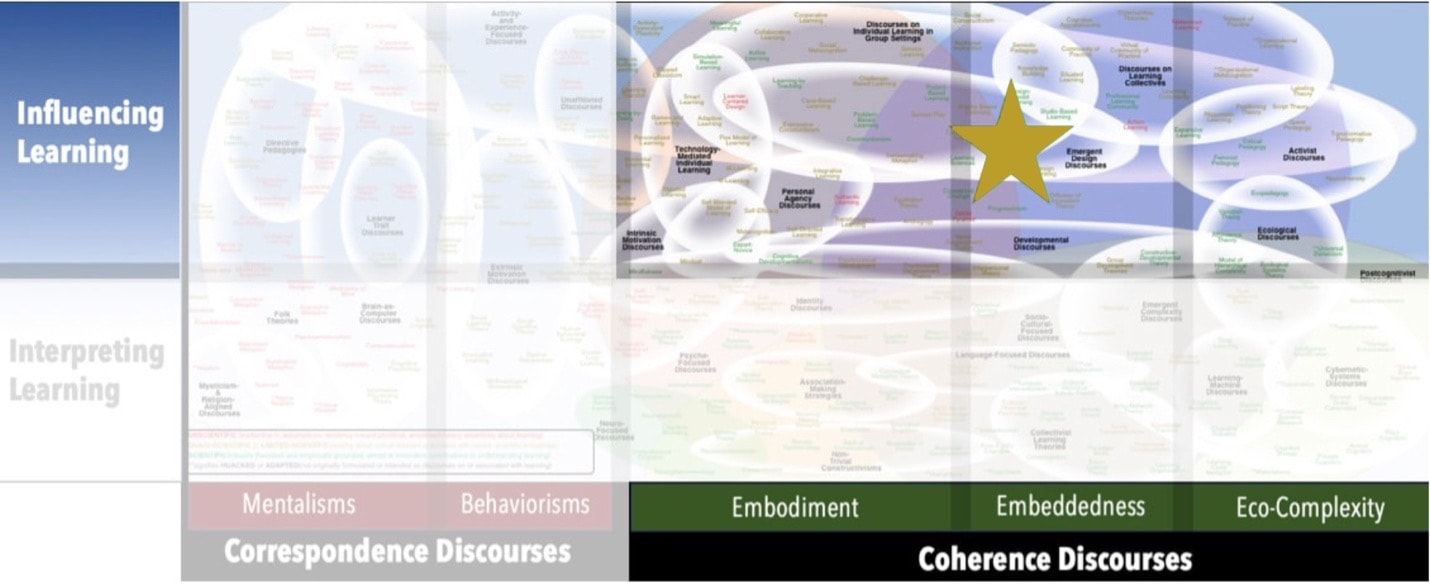Focus
Environmental patterns that occasion thinking and behaviourPrincipal Metaphors
- Knowledge is … interpretations and actions summoned (attracted) by situations
- Knowing is … interpreting and acting fittingly
- Learner is … individuals in social systems
- Learning is … fitting into a social system
- Teaching is … orienting, triggering
Originated
2000sSynopsis
Cognitive Attractor Theory focuses on the environmental patterns that occasion (i.e., call forth; trigger; summon) thoughts and behaviours of individuals and social collectives. Aligning with Gestaltism and Affordance Theory, Cognitive Attractor Theory proposes that combinations of environmental information and situated experience prompt specific activity. Altering those conditions can affect thinking and behaviour, and so environments can be designed to occasion specific (desired) emergent behaviors of the agents in a system. Discourses on strategies to effect collective change that are associated with Cognitive Attractor Theory include:- Empirical-Rational Strategy – an attitude toward social transformation aligned with the conviction that distribution of compelling factual evidence is sufficient to occasion collective change
- Normative-Reeducative Strategy – an attitude toward social transformation that focuses on interrupting social norms and offering alternatives to cultural traditions, founded on the conviction that beliefs and behaviors are usually rooted in resilient attitudes and entrenched practices
- Power-Coercive Strategy – an attitude toward social transformation that is based on uses of force, both subtle and gross, to effect collective change. Most often, the preference is for non-violent approaches, such as demonstrations and lobbying.
Commentary
“Attractors” are important constructs in Complex Systems Research, because they combine notions of constant change and relative stability. In complex systems, change pulses or evolves around relatively stable attractors. With specific regard to social and mental systems, always-evolving individual thoughts tend to converge onto prevailing attitudes (or attractors, which also evolve, but over a longer timeframes)..Authors and/or Prominent Influences
Saadi LahlouStatus as a Theory of Learning
Cognitive Attractor Theory is not a theory of learning.Status as a Theory of Teaching
Cognitive Attractor Theory is appropriate construed as a theory of teaching, as it offers advice on attending attractors of social systems and using them to inform efforts to trigger or occasion desired happenings.Status as a Scientific Theory
Cognitive Attractor Theory has not yet accumulated sufficient empirical evidence to meet our criteria for a fully scientific theory. That said, it does meet the criterion of theoretical coherence, as attractors are thoroughly researched phenomena within Complex Systems Research.Subdiscourses:
- Empirical-Rational Strategy
- Normative-Reeducative Strategy
- Power-Coercive Strategy
Map Location

Please cite this article as:
Davis, B., & Francis, K. (2022). “Cognitive Attractor Theory” in Discourses on Learning in Education. https://learningdiscourses.com.
⇦ Back to Map
⇦ Back to List
